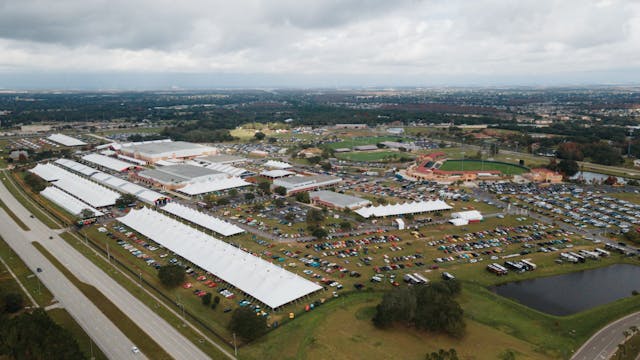Mecum Kissimmee: The largest collector-car auction just keeps expanding
Want a better understanding of what’s driving collector-car values? Sign up for the Hagerty Insider newsletter.
Kissimmee, which may or may not mean “where the mulberries grow,” as named by some lost-to-time Native American tribe, represents something entirely different to classic car enthusiasts: the annual Mecum Kissimmee auction, located in this suburb southwest of Orlando, Florida.
It’s the world’s largest classic car auction by number of vehicles offered, and often by total sales volume in U.S. dollars. By number of consignments, it’s roughly double the size of the second largest—which also happens to be a Mecum production. It started with a tent and a couple hundred vehicles. This year, there are 4000. The size of the production is sobering.
Mecum CEO Dave Magers took a walk around the auction grounds on Tuesday, January 3, the day before the 12-day auction opened. “As I always do, I said to myself at 2 o’clock yesterday afternoon, ‘We’re not going to make it. We’re not going to be ready to go.’ I went back to the hotel, came back this morning—and everything’s perfect.”
Magers added, “We’re almost 50 percent bigger this year than last, with the opening of the new lot,” where a lake used to be. The lake was moved and filled in to accommodate this auction, and now 1100 more cars can park where the lake was. There’s more than a million square feet under cover in buildings and tents, and at least that much land packed bumper-to-bumper with classic cars.
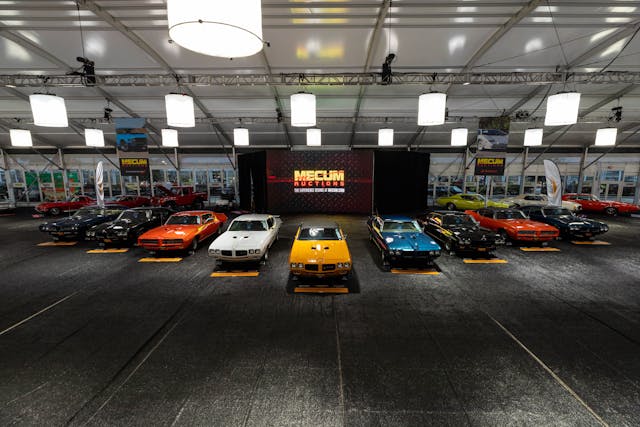
Most are classic cars, anyway. Some are just used, while some aren’t even cars at all. On the event’s 2023 opening day, the first time it started on a Wednesday, there was a lovely black 1957 Chevrolet Bel Air, a 1933 Ford hot rod replica, a BMW X5 SUV, and a six-wheel Jeep Gladiator. The auction ended after dark with a Polaris Scrambler (gavel price $8800), a quarter-midget race car ($3300), and a John Deere Gator ($14,700). “Those things are hard to find,” the auctioneer said helpfully.
Like any huge auction, you never know what’s going to turn up. This year, much of the publicity was for a well-worn Lockheed jet that Elvis Presley had owned for a year. It was still sitting at a New Mexico airport, neglected for decades and missing all four engines and most of the avionics, but the obligatory red velvet upholstery remained mostly intact. It went for “just” $260,000, despite the unexpected appearance of Priscilla Presley. No vehicle is too large or too small to auction off, and that runs from private jets to pedal cars. It’s all part of the spectacle.
And it’s a spectacle that has us wondering, how exactly did this Kissimmee thing get so big? So, we asked some of the people who know.
Harold Gerdes, vice president of operations: “I’ve been at Mecum for 22 years. There were 12 people in the company then. One little trailer and a motorhome. Everybody did everything.” There are 450 people at the Kissimmee auction now working for Mecum, which is based in Walworth, Wisconsin, population 2300.
Gerdes was in the event planning business when he met Dana Mecum and was impressed by his ambition to grow the company. “He comes up with ideas and we implement them,” Gerdes says.
Gerdes was there 23 years ago when the auction started out in Old Town, a Kissimmee tourist attraction near Disney. It was mostly a Corvette auction then.
“After one of the auctions, I was driving by this location on the way to the airport. I saw all this land. I pulled in and we started talking,” Gerdes says.
The first year, they were on the corner of the property, which turned out to be the county-owned Osceola Heritage Park. One tent, then two, then they moved into the Events Center. Then the crowd got so big the fire marshal spoke up, and they moved to the Arena, where they normally have concerts and rodeos. That’s where the auction floor is now. Drive in one end, out the other: “It’s perfect.”
Osceola Heritage Park has over 200 acres to park cars before and after they sell. Plus, sold cars get trucked out, new cars trucked in. Twenty semi-trailers are required to get it all done.
Mecum Kissimmee is the first major auction of the year, and as such benefits from pent-up demand, as well as sellers looking to pay off their Christmas. It’s an annual perfect storm of an auction, Gerdes says.
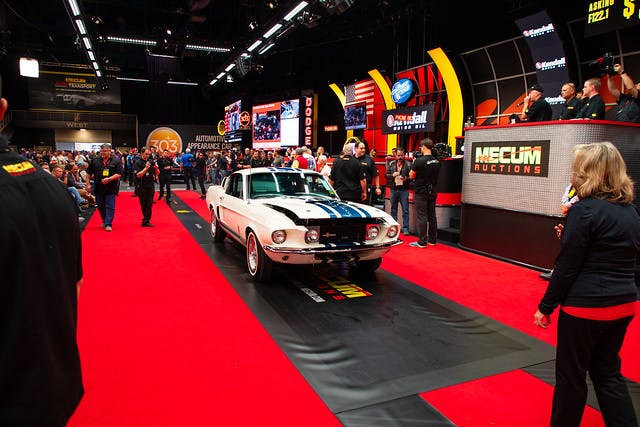
Dave Magers, CEO since 2012: Magers, a longtime car buff, was hired by family patriarch Dana Mecum—the company is still Mecum-owned—to leave his career in finance and insurance and come run the business end. While Magers keeps the business’ engine running in the background, Dana runs the auctions.
“Last year,” Magers recalls, “we had 3300 vehicles. And I was standing behind Dana when he announced we were going to have 4000 cars this year. And I thought, ‘No way in hell.’ Well, 45 days ago we knew we were going to have more than 4000 cars. We ended up with over 4200 and basically added two days to the event. I’m going to be really disappointed if we don’t set another record.
“Is 5000 possible? That’s the big question everybody’s asking. I think it is.
“The first Kissimmee I was involved in, which would have been 2012, I said, ‘Boy, if we could ever get this up to 1500 cars it would really be something.’ Took two years to get to 1500, then 2000 was the goal. And then 2500 was the goal.
“We scratch our heads, just like everybody else, thinking ‘How big can it become?’ We were taken aback by the $220 million last year; we were thinking 175, maybe 180. With the motorcycle auction in Las Vegas, we ended up doing about $240 million for the month.” Four months later, in Indianapolis, they did $100 million with about 2600 cars.
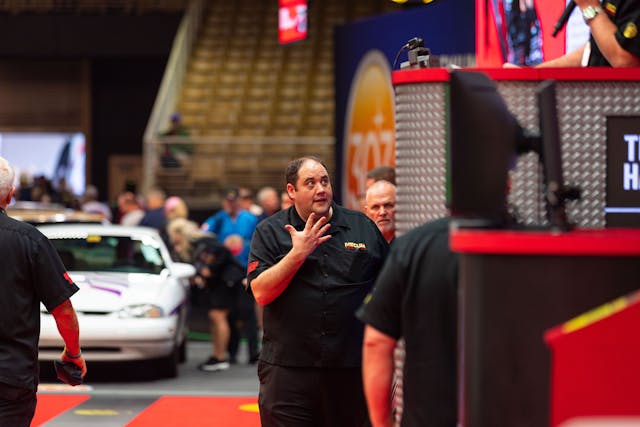
Mecum sells cars for well into six figures. In 2022, more than 30 vehicles transacted above the million-dollar mark, and Mecum boasted multiple world-record prices for individual vehicles throughout the year. Still, Magers considers Mecum the “blue collar” auction company.
“The high-end cars we attract are just part of the evolution of the company. We want the guys buying a $3000 car, and the guy buying a $3 million car.”
In 2014, Mecum was already the largest collector car auction company by number of events held and vehicles consigned, “but we weren’t the most recognizable. Barrett-Jackson was,” says Magers. “So we set out to change that.” He came up with a package of initiatives that took over five years to implement, but Magers says it worked. A large part of the success, and part of what made Barrett-Jackson a household name, was TV time. Airing the auctions on NBC Sports and MotorTrend TV brings live auction excitement out from the event and into living rooms, bars, and restaurants. Along with the outward-facing effort, they streamlined their customer service and paperwork operations.
After five years of implementing Magers’ initiatives, the pandemic hit. Kissimmee 2020, held in January, went off normally, but “we were at our auction in Glendale, Arizona, in March of 2020 that Wednesday night when the world melted down. We spent the last three days of the auction in Glendale selling cars to crickets.”
There was a scramble to change direction from in-person bidding to internet bidding, but Mecum came back to live audiences, and fast. “In July, we were the only live event company doing anything.” Yet the internet bidding stayed strong even with the stands full. “At Indianapolis, we used to average 50 online bidders. We had 1700 our first time back.”
At the same time, with professional sports on hold, the TV opportunity exploded. Mecum got 980 hours of television rather than the 250 expected for 2020. The circumstances that came out of the pandemic highlighted that the collector car auctions are about more than the cars that cross the block. “We are in the entertainment business,” Magers says. “We just happen to entertain by having auctions.”
Jimmy Landis, head auctioneer: “From that first year in Kissimmee in Old Town, and now we’ve got this. I never imagined it would evolve this way.”
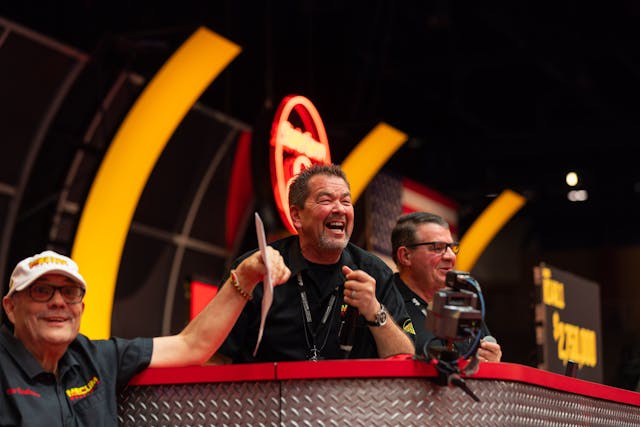
Landis is a second-generation classic car auctioneer. He has been with Mecum since 2000. “It’s the greatest ride I could have ever hoped for.” He does all the Mecum auctions, including tractors and motorcycles. “You ever been to a tractor auction? You’d get a kick out of it if you like tractors,” he says.
“They’re talking about 5000 cars here next year—it’s hard to wrap your head around. I mean, 2000 was hard to wrap your head around.
“We’ve got something for everyone here, and that’s what helped this auction grow. You buy one car and you’re in the hobby. People I’ve met in the 1980s and ’90s are still in the hobby, still close friends, though I may only see them once or twice a year.
“The experience of just coming here and walking the grounds, looking at all the beautiful cars lined up—it’s just cool. And when you finally decide to jump into the hobby, it’s even more fun.
“When we go to other auctions, people always talk about having to come down to Kissimmee. It’s become elevated in people’s minds.”
Robb Larson, general manager, Osceola Heritage Park: “It’s turned into almost a festival. We have the Dodge thrill rides, food and beverage, music on the stage … it’s become quite a tradition for a lot of people who look forward to it every January. It didn’t happen by accident—there was a lot of hard work involved, but there is a little magic taking place here, too.”
A county-wide economic study showed a positive economic impact of over $56 million a year. “It’s been significant for our community. It pretty much checks off every box for why I come to work every day.”
In the end, Mecum did set another record. In 2022, Kissimmee became the first single collector car auction to exceed $200M, and in 2023 it exceeded that yet again with a reported $234M in total sales. A record 3180 vehicles sold, record numbers of both registered bidders and spectators attended, and a total of 13 vehicles brought seven-figure sale prices.
Will they do it again next year, with 5000 cars? We’ll see.
Check out the Hagerty Media homepage so you don’t miss a single story, or better yet, bookmark it. To get our best stories delivered right to your inbox, subscribe to our newsletters.
